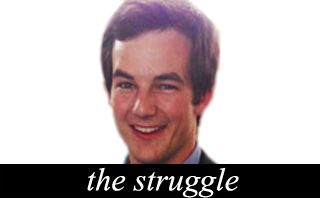It happened at the Homecoming Ball of my sophomore year. Separated from the roving pack of underclassmen I had entered the tent with, I was wandering aimlessly in search of leftover buffet food when an acquaintance of mine who had graduated the year before pulled me aside. “Tom! You’re interested in global health, right? Come meet my friend...he interned in Kenya back when he was at Duke, so he might be a good person for you to talk with.”

Shocked that an alumnus would be sober enough—let alone willing—to facilitate a networking experience at 11 p.m. on Friday of Homecoming weekend, I frantically snatched up a napkin to clean off my hors d’oeuvre-stained hands just in time for the quintessential tipsy handshake/arm grab that characterizes such events. “First of all, I’m so jealous that you still get to do this party stuff every weekend,” he told me. “But anyways, why are you interested in global health?”
Things went downhill from there. My initial irrational hope that the conversation would eventually lead to me taking part in a fully funded research project soon turned into merely a desperate desire to make it out of the party tent with at least some of my dignity. “I think Paul Farmer is a cool dude, so I did the Global Health FOCUS program freshman year but still don’t really know if it’s my passion” does not make for good self-promotion. After all, people don’t want uncertainty personified sitting two cubicles over from them. They want someone dead-set on a career in their industry, a trait someone like me who still has second thoughts about his major could not honestly claim to have.
Of course, it’s more than a lack of knowledge about my life’s ideal trajectory that keeps me in the shallow end of the pool when it comes to networking. For instance, I have no idea how to hold someone at the professionally acceptable arm’s length. Given the choice between harassing a potential employer with my elevator pitch—think “I’m an economics major and global health minor from Duke University interested in a career in...because...”—and comparing notes with him or her on the best restaurants in the area, I’ll instinctively select the latter of the two. As a college student, I’m accustomed to informal conversation, and productive networking is anything but that, at least until you’re connected on LinkedIn.
Simply not knowing how to tell if personal stories are an appropriate avenue for relationship building (hint—they most likely are only if you and the person whose business card you want were in the same Greek-letter organization or like the same greasy-spoon Mexican restaurant on Ninth Street) is only one reason for my trepidation at meet-and-greets and business dinners. Additionally, I’m almost always out of my comfort zone when it comes to talking shop—sure, I can discuss Burger King’s recent corporate inversion or the public health implications of anti-vaccination sentiments among Southern California soccer moms, but my true comprehension of those subjects barely scratches the surface of what someone with a decade, even a year, of real-world industry experience knows about them. Perhaps it’s because my liberal arts education is damning me to a lifelong procession of social media management internships and barista gigs (unlikely), or perhaps I’m simply terrified of making even a single mistake in the presence of someone in a position of power. With the race for first-round interviews and case competition victories becoming more competitive each year, I could just be too risk-adverse, too afraid of falling prey to a repeat of the Homecoming fiasco, to talk to a potential boss without getting tongue-tied.
In reality, however, every single one of us will make mistakes. Even the best of us, with the 3.87 GPA's, club presidencies and firm handshakes, will eventually misspell someone’s name in a letter of interest or confuse balance sheets with income statements. A finance minor is going to be just as disoriented and stressed as a history major on the first day of work, and grabbing coffee with your boss’s boss during recruiting season does not guarantee your own boss will like you any more. As Murphy’s Law dictates, anything that can go wrong will go wrong.
What can we do, then? We see perfection as the baseline by which everyone from professors to interviewers judges us, but that shouldn’t paralyze us with fear of inadequacy. Instead, it should give us reason to rejoice. No one can live up to a Platonic ideal, even those who market themselves as “driven, well-rounded critical thinkers," so we might as well ignore it and make a joke or two with our coffee chat partners. At worst, it’s a warm-up for our 30 minutes in the human resources office next week.
Two weeks ago, I took on that exact mindset and emailed a well-known professor of urban planning at University of North Carolina Chapel Hill regarding the possibility of enrolling in his graduate seminar on public transportation this spring. He hasn’t responded. Instead of interpreting his reticence as a sign of disgust, though, I’m still planning to see him on First Day of Classes.
Sometimes we just have to embrace our imperfections, ignore our insecurities and shake it off.
Tom Vosburgh is a Trinity junior. His column runs every other Tuesday.
Get The Chronicle straight to your inbox
Signup for our weekly newsletter. Cancel at any time.
